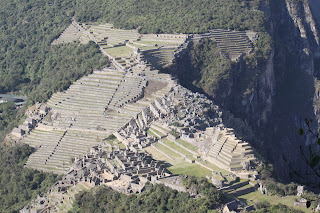Monday, December 30, 2013
Machu Picchu - Cusco Region - Peru
Machu Pikchu (Quechua machu old, old person, pikchu pyramid; mountain or prominence with a broad base which ends in sharp peaks,[1] "old peak", pronunciation [ˈmɑtʃu ˈpixtʃu]) is a 15th-century Inca site located 2,430 metres (7,970 ft) above sea level.[2][3] It is located in the Cusco Region, Urubamba Province, Machupicchu District in Peru.[4] It is situated on a mountain ridge above the Sacred Valley which is 80 kilometres (50 mi) northwest of Cusco and through which the Urubamba River flows. Most archaeologists believe that Machu Picchu was built as an estate for the Inca emperor Pachacuti (1438–1472). Often referred to as the "Lost City of the Incas", it is perhaps the most familiar icon of Inca civilization.
The Incas built the estate around 1450, but abandoned it a century later at the time of the Spanish Conquest. Although known locally, it was unknown to the outside world before being brought to international attention in 1911 by the American historian Hiram Bingham. Since then, Machu Picchu has become an important tourist attraction. Most of the outlying buildings have been reconstructed in order to give tourists a better idea of what the structures originally looked like.[5] By 1976, thirty percent of Machu Picchu had been restored.[5] The restoration work continues to this day.[6]
Since the site was not known to the Spanish during their conquest, it is highly significant as a relatively intact cultural site. Machu Picchu was declared a Peruvian Historical Sanctuary in 1981 and a UNESCO World Heritage Site in 1983.[3] In 2007, Machu Picchu was voted one of the New Seven Wonders of the World in a worldwide Internet poll.
Machu Picchu was built in the classical Inca style, with polished dry-stone walls. Its three primary structures are the Intihuatana (Hitching post of the Sun), the Temple of the Sun, and the Room of the Three Windows. These are located in what is known by archaeologists as the Sacred District of Machu Picchu.
Machu Picchu is vulnerable to threats from a variety of sources. While natural phenomena like earthquakes and weather systems can play havoc with access, the site also suffers from the pressures of too many tourists. In addition, preservation of the area's cultural and archaeological heritage is an ongoing concern. Most notably, the removal of cultural artifacts by the Bingham expeditions in the early 20th century gave rise to a long-term dispute between the government of Peru and the custodian of the artifacts, Yale University.[7][8]
Subscribe to:
Post Comments (Atom)












No comments:
Post a Comment